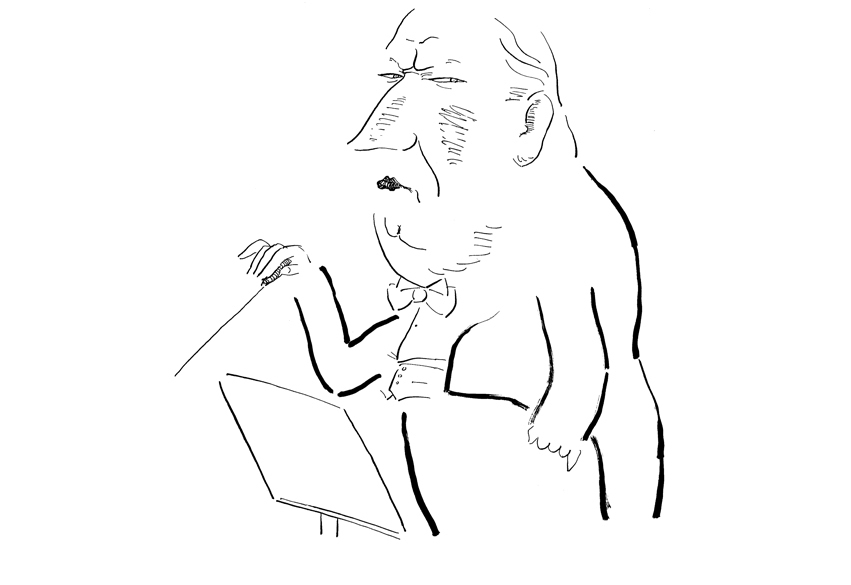If David Cameron and his friends wish to know why they and their policies are so despised by some Conservatives of high intellect and principle, they should read Robin Harris. His book is a marvel of concision, lucidity and scholarship, with penetrating things to say about Peel, Disraeli, Salisbury, Baldwin, Churchill, Macmillan and the rest. But much of its savour derives from Harris’s disgust — the word is not too strong — with the various forms of bogusness, including intellectual cowardice veiled by complacent politeness, which recur so often in the history of the Conservative party.
Harris recognises the ‘note of genius’ in Disraeli, but scorns the pious, posthumous ascription to him of an overriding concern for social reform: ‘What really mattered to Disraeli in the course of his career were the monarchy, the landed interest and, above all, national prestige.’ As Salisbury said in the Lords in tribute to his old chief: ‘Zeal for the greatness of England was the passion of his life.’
For Harris, Salisbury is ‘probably the most recognisably and intelligently conservative leader the party has ever had’. Salisbury did not believe in democracy, having written while supporting the losing side in the American Civil War: ‘Every community has natural leaders, to whom if they are not misled by the insane passion for equality, they will instinctively defer.’ Yet he recognised the importance of ‘villa Toryism’ in the new suburbs, and of party organisation as the means to mobilise it and win elections.
In 1903, Salisbury arranged the smooth succession of his nephew, Arthur Balfour, to the premiership. The party accepted its new leader with enthusiasm, but as Harris writes: ‘The unanimity of welcome represented a peculiarly Conservative mix of good manners, complacency, self-delusion and hypocrisy.’ Balfour led the party to the smash of 1906.
Stanley Baldwin was worse. Two of his chief characteristics were ‘lethargy’ and ‘messianic illusion’. His ‘New Conservatism’ amounted to a mood rather than a programme. He won huge majorities, but had no idea what to do with them: ‘In Baldwin the country got what it wanted and, arguably, to stray into more disputable territory, it got what it deserved. But it did not get what it needed.’
Harris has a strenuous idea of politics. It is not enough to hold power: you must use it. When Churchill returned to power in 1951, he chose simply to hold it. Macmillan — Prime Minister from 1957 to 1963 — was worse: smug, banal, not a conservative, not a strategic thinker, cunning, unscrupulous, affected, cynical, deceitful, given to paranoid fantasies and wishful thinking, and with no idea how to arrest economic decline. He won a great election victory in 1959 and exerted personal charm.
Heath, Prime Minister from 1970-74, was the continuation of Macmillan by other means. Heath had many character flaws: ‘That he finished a most unpleasant human being is hardly disputable.’ But the real trouble was his economic policy. The 1970 manifesto said: ‘We utterly reject the philosophy of compulsory wage control.’ But no other means of controlling inflation was envisaged. Harris characterises the phrasing with which the manifesto tried to hide this void as ‘tritely mendacious’.
From 1979, power was not just held by Margaret Thatcher: it was used by her to pursue ‘a clear and consistent strategy to revive Britain’s economic strength … and international standing. This strategy was overwhelmingly successful.’ Harris worked for Mrs Thatcher, as she then was, and intends to publish a full-length biography of her when she is dead.
The final chapter in the book is entitled ‘Cameron’s Party?’ and contains many scathing observations. Harris observes that Cameron and many of his closest colleagues were trained in the Conservative Research Department (some while Harris himself was its director), and that the CRD has its own variety of déformation professionelle: ‘Like marketing, it emphasises technique rather than ideas.’ This weakness is all too apparent in the present government:
By contrast with the Thatcher revolution, the modernising project lacks intellectual ballast. Some of those involved were and are extremely clever. They know the literature. But they have lacked a directing idea. Game theory, evolutionary biology and neurology have all been invoked to fill the void. David Cameron has said that the Big Society is more important to him than anything else in Government. It is in essence, though, yet another ‘Third Way’ strategy — in this case, a third way between the Scylla of Thatcherite individualism and the Charybdis of Big Government socialism.
We catch an echo of the famous passage in Newman’s Apologia about the supposed need for ‘sensible, temperate, sober, well-judging persons’ to guide the Church ‘through the channel of no-meaning, between the Scylla and Charybdis of Aye and No.’
Harris has never been prepared to go along with this kind of thing, so reminiscent of the Church of England at its most muddled, and he doubts whether Conservative backbenchers will tolerate it for much longer. But whether or not one feels as cross as Harris, his book can be read for pleasure as well as instruction.






Comments